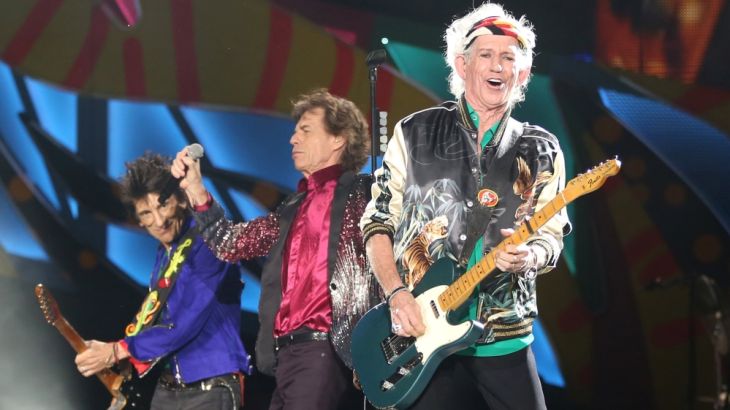Rolling Stones rock into Cuba and make history
Music legends perform at free concert in Havana, in what some see as a sign of the country further opening to the West.

The Rolling Stones have rocked almost half a million jubilant Cubans in Havana, delivering a historic concert in a country where ardent fans once listened to their music behind closed doors.
“Hello Havana! Good evening to my Cuban people,” lead singer Mick Jagger shouted in Spanish on Friday as he launched into the classic “Jumpin’ Jack Flash.”
Keep reading
list of 4 itemsKing Charles unveils royal portrait
Cannes film festival hopes for ‘no controversies’ as wars, scandals rage
Energy summit seeks to curb cooking habits that kill millions every year
The concert on Friday came just two days after Barack Obama finished the first trip to Cuba by a US president in nearly 90 years.
The free concert, billed as the biggest in the country’s history, sought to cement the communist-run island’s opening to the world.
Security was heavy, provided by private guards in yellow jackets and hundreds of Cuban police and black-clad interior ministry officers in black jumpsuits.
While no official estimate was immediately available for the crowd size, Cuban state media estimated 500,000 people could fit in the venue, which was nearly full.
![Fans wait for the free outdoor concert by the Rolling Stones at Ciudad Deportiva de la Habana sports complex in Havana [Reuters]](/wp-content/uploads/2016/03/d6bfa8a9af1a4627b6c92ed970d3d412_18.jpeg)
The audience ranged from teenagers to pensioners and reserved some of the biggest cheers for Jagger’s snakey dance moves.
“After today I can die,” night watchman Joaquin Ortiz told the AP news agency.
The 62-year-old said he’d been a huge rock fan since he was a teenager in the 1960s, when Cuba’s communist government frowned on US and British bands and he had to hide his Beatles and Stones albums in covers borrowed from albums of appropriately revolutionary Cuban groups.
“This is like my last wish, seeing the Rolling Stones.”
![A fan takes a photograph while sitting on a pole before a free outdoor concert by the Rolling Stones [Reuters]](/wp-content/uploads/2016/03/54a903a353e749d5a9f2a08b10e51cbc_18.jpeg)
Spectators held up signs reading “Republica Stones” and “We Love The Stones,” while t-shirts with the band’s trademark lips and tongue were common.
On arrival in Havana, Jagger alluded to recent changes in the country.
“Obviously something has happened in the last few years,” the lead singer told reporters at Jose Marti International Airport.
“So, time changes everything… we are very pleased to be here and I’m sure it’s going to be a great show.”
![Members of The Rolling Stones, from right, Ron Wood, Keith Richards and Mick Jagger deplane at Jose Marti international airport [AP]](/wp-content/uploads/2016/03/88bcfc18ce914b1eb4b9e034d36ba438_18.jpeg)
Obama re-established diplomatic relations with Cuba last year and called for the two countries to move toward full normalisation in order to end the legacy of the Cold War.
In the heat of Cuba’s revolution from the 1960s to the 1980s, foreign bands such as The Rolling Stones were considered subversive and blocked from the radio.
Western rock music wasn’t officially prohibited in public, but it was disapproved of. Cubans listened to their music in secret, passing records from hand to hand.
But in more recent years several bands have played in Cuba, including the Manic Street Preachers, a Welsh band, that played at the Teatro Karl Marx in 2001, with Fidel Castro in the audience.
A statue of John Lennon, the former Beatle and peacenik, was unveiled in a Havana park in 2000.
And, in 1979, during a previous US-Cuba rapprochement, Kris Kristofferson and Billy Joel played the same venue.
![The bronze statue of the late Beatle John Lennon was unveiled in Havana, Cuba, in 2000 [AP]](/wp-content/uploads/2016/03/c7ebfae022a24425a0f23adc42fe5735_18.jpeg)